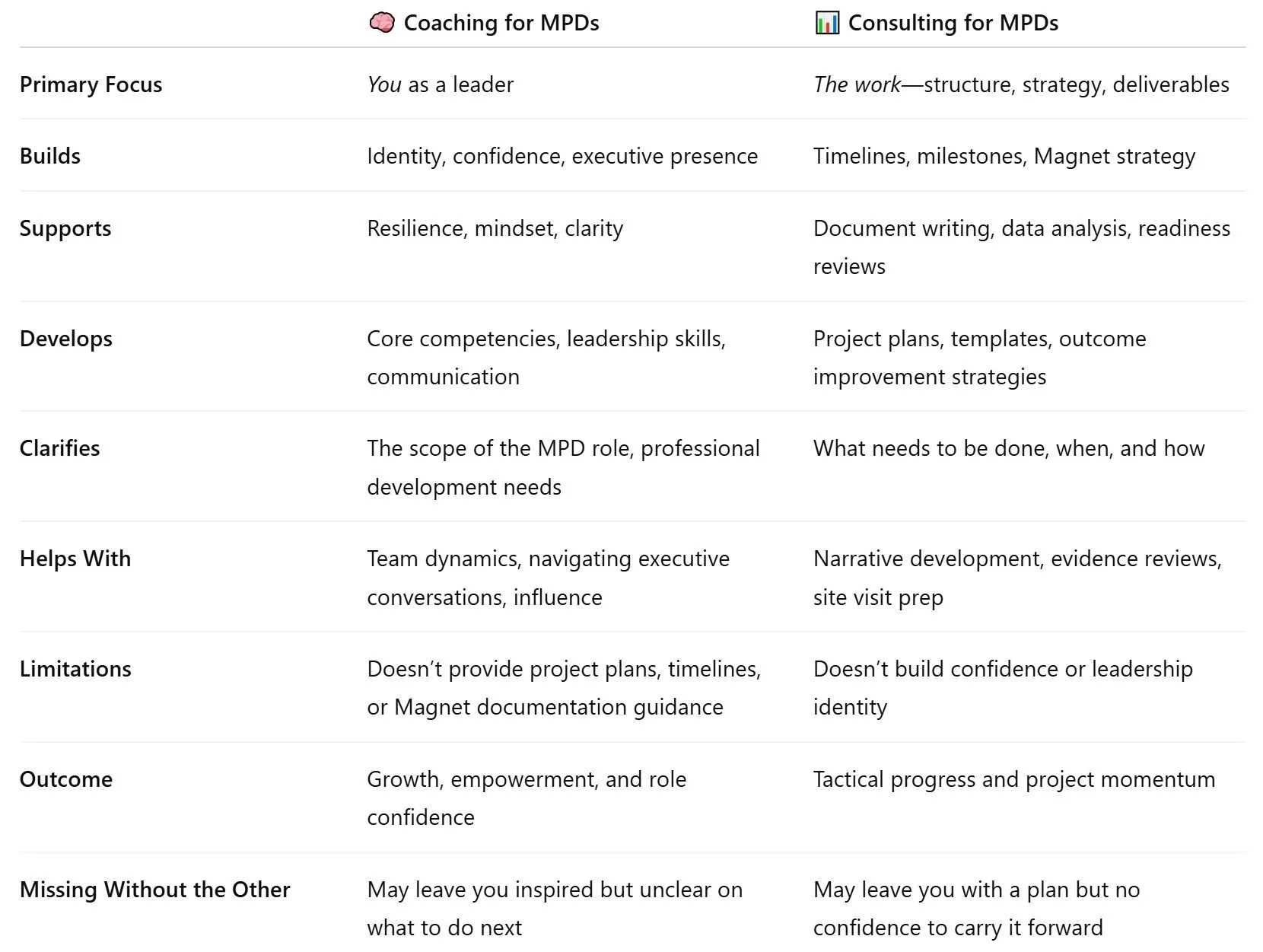Coaching or Consulting: What’s Best for New Magnet Program Directors?
Hi there, and welcome to the Excellence in Nursing Blog!
If you’re a new Magnet Program Director (MPD), you’ve probably asked yourself this at least once:
“Do I need a coach? A consultant? Or… both?”
You’re not alone. It’s a common question—and an important one.
The MPD role is one of the most unique and high-pressure leadership positions in healthcare. You’re not only navigating a complex designation process; you’re also stepping into a highly visible, often executive-level leadership role.
For many, this is their first time operating in that kind of space.
It’s a big leap—and most new MPDs receive very little preparation before they’re handed the title, the responsibility, and the expectation to “figure it out.”
So today, let’s break it down:
What’s most beneficial when you’re a new MPD—coaching, consulting, or a combination of both?
🚧 What New MPDs Are Up Against
Most new Magnet Program Directors are navigating two steep learning curves at once:
➡️ Magnet + Executive Leadership
(i.e., mastering the Magnet journey and stepping into executive-level nursing leadership.)
On one hand, you're expected to learn the intricacies of the Magnet Recognition Program—data collection, documentation, timelines, team engagement, and all the moving parts that drive a successful designation.
On the other hand, you're stepping into a highly visible leadership role—often your first time at the executive table—where you're expected to influence strategy, communicate across disciplines, and drive system-level change.
When I moved from nurse manager to the executive suite, I realized quickly: this is an entirely different world.
The expectations shift.
You’re no longer just managing people and workflows—you’re shaping high-level strategy and culture, influencing outcomes across the organization, and representing nursing at the highest levels.
Now imagine trying to do all of that while also leading your organization through the complexities of the Magnet journey.
That’s the reality for many MPDs—and it’s why I’m so passionate about supporting them.
New MPDs are often handed:
A vague job description
Massive responsibility
And an unrealistic expectation to “figure it out and get us to Magnet”
And I’ve seen it time and time again…many new MPDs end up feeling:
Overwhelmed and isolated
Unsure where to start
Pressured to produce quick wins
And deep down, they’re asking:
“Am I really cut out for this?”
🧠 What Coaching Offers New MPDs (and What It Doesn’t)
Coaching is powerful—it helps Magnet Program Directors build self-awareness, grow into their nurse leader identity, and develop the resilience and confidence they need to lead boldly.
But for MPDs, that’s just the beginning.
The right coaching also brings clarity around role expectations, supports the development of core MPD competencies, and helps you create a focused, actionable professional development plan.
Many MPDs step into this role with little to no onboarding—and often, there’s no one else in the organization who truly understands what the MPD is responsible for. That can feel isolating and disorienting.
A coach who understands both executive leadership and Magnet can help you:
Understand the true scope and expectations of your role
Identify skill and knowledge gaps
Strategize how to grow into the leader the role requires
Navigate dynamics with executives, data owners, and frontline teams
But here’s the thing:
Coaching alone still doesn’t prepare you for Magnet readiness.
Coaching alone doesn’t help you write the Magnet document, build data stories, manage a timeline, or lead the project from start to finish. It won’t teach you how to coordinate teams, run interdisciplinary meetings, or make strategic decisions under pressure.
So while coaching can help unlock who you are and how you want to lead, it doesn’t always solve the tactical “what,” “when,” or “how” that most MPDs are desperate to get clarity on.
📊 What Consulting Offers New MPDs (and What It Doesn’t)
Consulting brings expertise, structure, and strategy.
It focuses on the work itself—and helps you get unstuck, aligned, and into motion.
A Magnet consultant can help you:
Map out a realistic timeline
Develop targeted strategies to strengthen engagement, professional governance, or your clinical ladder.
Assess readiness and identify gaps
Analyze data and supporting documentation
Craft strong narratives and evidence
Create clarity and forward momentum
Reignite progress when you’re stalled or unsure what to do next
This kind of support is critical—especially when executive leadership wants to see results now.
But here’s the catch:
Consulting without coaching can leave MPDs feeling disconnected, overwhelmed, or overly dependent.
You might have a solid plan on paper—but still wonder whether you’re the leader who can actually carry it out.
You might be hitting milestones—but feel like you're just checking boxes, without a true sense of purpose, confidence, or ownership.
Without the internal growth that comes from coaching, even the best consulting can fall flat.
🤔 Coaching vs. Consulting: What's the Difference?
Need a quick side-by-side comparison?
Below is a high-level snapshot that breaks down the unique focus, strengths, and limitations of coaching and consulting for Magnet Program Directors:
Use this as a tool to reflect on what kind of support you need—and what might be missing.
💡 So What’s the Right Choice for New MPDs?
This is where I land:
Most new Magnet Program Directors don’t just need coaching.
And they don’t just need consulting.
They need a blend—a personalized combination that fits their role, their personality, and their unique context.
Because here’s the truth: No two MPDs walk the exact same path:
Some are brand new to formal leadership, while others are seasoned leaders navigating Magnet for the first time.
Some have a strong internal team to lean on; others are flying solo.
Some are in early planning phases; others are racing toward a site visit.
Each organization also brings its own culture, structure, resources, and level of Magnet readiness.
Different timelines. Different expectations. Different challenges.
That’s why support needs to be flexible, responsive, and tailored—not templated or rigid.
Because when the right kind of support meets the right kind of leader at the right time?
That’s where momentum builds. And confidence grows.
🔀 Why I Blend Coaching and Consulting for New MPDs
When I work with new MPDs, I don’t separate the person from the process.
My approach intentionally blends both coaching and consulting so that you:
✅ Grow into your role as a confident, capable nurse leader
✅ Build real traction with clear deliverables, timelines, and strategy
✅ Feel supported as a person—not just as a project manager
I walk alongside MPDs as both a thought partner and strategic guide—helping them build a plan and become the kind of leader who can carry it forward.
This is where real transformation happens.
It’s not just about getting the work done—it’s about helping you grow into the leader who can lead the work well.
✨ It’s about traction and transformation. And I absolutely love it. ✨
📊 Making Magnet Support Simple
One thing I’ve learned—both as an MPD and now as a coach and consultant—is that access, ease, and flexibility matter… for everyone involved.
Leaders are navigating relentless pressure, shifting priorities, and limited time—and support should never feel like one more thing to manage.
One of our core company philosophies is to create as many wins as possible—for the MPD, for the organization, and for the mission of nursing excellence. We’re always looking for the win-win-win.
That’s why we’ve intentionally designed support options that are:
✅ Flexible – On-demand Magnet consulting that’s responsive and cost-effective
✅ Easy – Monthly coaching subscriptions with no long contracts or red tape
✅ Secure – Legally pre-cleared confidentiality agreements to fast-track engagement
Because let’s be honest: The work is already hard enough.
Getting support shouldn’t be.
🧩 A Quick Note on MPD Competencies
One of my favorite tools to use is the Magnet Program Director Competency Framework—a structured way to assess where an MPD is now and what they need to grow with clarity and confidence.
Having been an MPD myself—and having worked with so many over the years—I’ve seen firsthand how valuable it is to have a roadmap that goes beyond the tactical “how-tos.”
This framework supports both sides of the role:
The strategic and technical demands of Magnet documentation and data
The leadership, communication, and influence needed at the executive level
It helps MPDs:
Understand where they’re strong
Identify areas for growth
And clarify what kind of support—coaching, consulting, or both—can close the gap
📌 (I’ll be sharing more on the Competency Framework in an upcoming blog post—stay tuned!)
💬 Final Thoughts
I truly believe the MPD role is one of the most important—and often one of the most misunderstood—roles in nursing leadership today.
For the ones asking, “Can I really do this?”
The ones hungry to grow, but not sure where to start…please know this:
✨ You’re not alone.
✨ You’re not expected to know it all on day one.
✨ And yes—it’s okay to ask for help. You deserve support.
Blending coaching and consulting is my way of meeting you where you are—and helping you build a path forward with clarity, confidence, and momentum.
👉 Ready to explore what this kind of support could look like for you or your team?
Let’s talk. Book a strategy call or download the MPD Handbook for actionable tips to get started.
✨ Remember, on the journey to excellence—YOU make the difference! ✨






